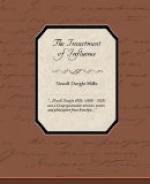That generation and individual must be far from perfect that is characterized by the presence of harshness and the absence of gentleness. With a great blare of trumpets our century has been praised for its ingenuity, its wealth and comforts, its instruments, refinement and culture. But history tells of no man who has carried his genius up to such supreme excellence that society has forgotten his vice or forgiven the faults that marred his rare gifts. What genius had De Quincey! Marvelous the myriad-minded Coleridge! The opium-habit, however, was a vice that eclipsed their fame and robbed them of half their rightful influence. Voltaire’s style was so faultlessly perfect that if the sentences lying across his page had been strings of pearls they could have been no more beautiful. But Voltaire’s excesses make a black mark across the white page before each reader’s mind. Rousseau’s writings are so melodious that, long after laying aside the book the ear would be filled with the sound of delicious music were it not that the reader seems ever to hear the moan of the four children whose unnatural father, without even giving them a name, placed them in the foundling-asylum.
Early Carlyle wooed and won one of the most brilliant girls of his day, whose signal talent shone in the crowded drawing-rooms of London like a sapphire blazing among pebbles. Yet her husband lacked gentleness. Slowly harshness crept into Carlyle’s voice. Soon the wife gave up her favorite authors to read the husband’s notes; then she gave up all reading to relieve him of details; at last her very being was placed on the altar of sacrifice—fuel to feed the flame of his fame and genius. Long before the end came she was submerged and almost forgotten. One day two distinguished foreign authors called




